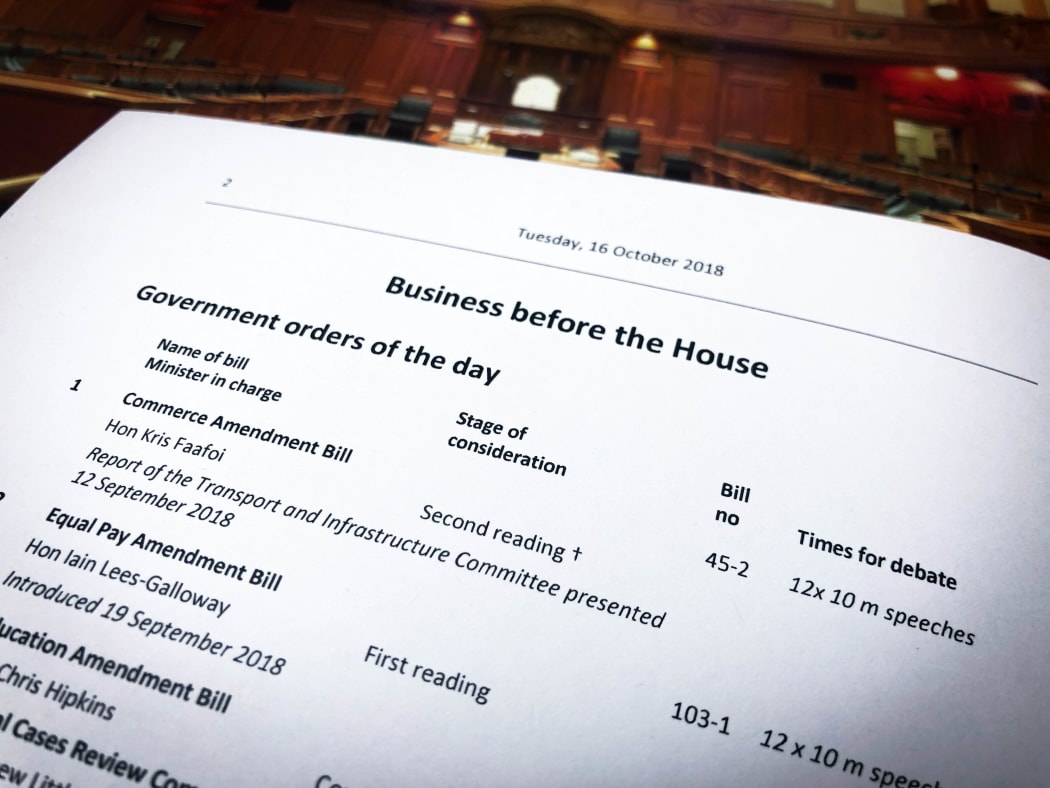Prepare for more long Tuesdays this week as the House plans to sit Wednesday morning.
Usually the House sits from 2pm on sitting days (Tues, Weds, Thurs on sitting weeks which are scheduled here) but if the Government feels they need more time to get things done it can extend one of the sitting days into the following morning.
They’re not kidding about the “extend” part either; the calendar marking Tuesday in the House won’t be flipped over till 2pm on Wednesday, so while the rest of the country starts Wednesday in the morning as usual, the House will still be stuck on Tuesday.
More on extended hours here.
The legislation they’ll work through while they’re messing with calendars is decided by the Leader of the House,Chris Hipkins.
An outline for this week (16-18 October) is below.

Photo: VNP / Daniela Maoate-Cox
MPs are required to be at Parliament for scheduled sitting days, so called because MPs sit in those green leather chairs when they’re in the debating chamber. An agenda known as the Order Paper is published online each sitting day outlining what business the House plans to get through. But things change and time is limited so below is what they’ll try their best to do.
Investigating fuel prices (Tuesday)
What:
-
The second reading of the Commerce Amendment Bill
-
The bill makes a couple of changes including introducing a competition studies regime (the fuel market is the first target), increased regulation of airports if required, and updating the alternative enforcement mechanisms available to the Commerce Commission.
Equal pay (Tuesday)
What:
-
The first reading of the Equal Pay Amendment Bill.
-
The Bill will describe what a pay equity claim is and introduce a new process for working through them.
-
To make a pay equity claim the employee needs to establish that their work is predominantly done by females and that it is currently undervalued.
-
If it’s agreed that a pay equity claim exists then the parties can use mediation tools in the Employment Relations Act toolkit to negotiate. The Bill allows for backpay to be agreed or ordered.
Why:
-
The bill is aimed at eliminating pay discrimination, based on sex, in the employment terms for work that’s mostly done by women.
-
Pay equity claims are settled through negotiation or by the courts but this bill provides a process for parties to bargain with each other directly.
Education Change-ups (Tuesday, Thursday)
What:
-
The committee stage (Tuesday) and third reading (Thursday).
-
The Education Amendment Bill undoes a few changes to education brought in under the the previous government. Amongst them it re-integrates ‘charter’ or ‘partnership’ schools back into the state system; and it ends the National Standards model.
Looking twice at convictions (Tuesday)
What:
-
The first reading of the Criminal Cases Review Commission Bill.
-
This bill creates a new body called the Criminal Cases Review Commission. Its job will be to review both convictions and sentences and decide whether to refer them to the appeal court.
-
This body will replace the the power currently exercised by the Governor-General under section 406 of the Crimes Act 1961.
-
There will be between three and seven commissioners who will have considerable powers including deciding their own methods; appointing experts; initiating investigations; requiring information; and even making “thematic inquiries into a practice, policy, procedure or other general matter it considers to be related to miscarriages of justice”.
-
The Governor General retains a Royal Prerogative of Mercy, but will be allowed to shunt such requests off to this new commission.
Why:
-
This move follows the example of a few European jurisdictions.
-
It takes the legwork for reviews away from the Ministry of Justice and gives it to an independent Crown entity - a step further removed.
-
It gives the review body wider power and resources to investigate, and to investigate more widely. Defence lawyers have complained in the past that they have had to all the investigative leg-work themselves.
-
Because recommendations to the Governor General will no longer come from the Minister of Justice, politics (or the appearance of politics) is removed from review decisions.
The Fibre Aftermath (Tuesday)
What:
-
The committee stage of the Telecommunications (New Regulatory Framework) Amendment Bill. The bill was brought to Parliament under the previous government and picked up by the current one.
-
Introduces a new outline for the regulation of fibre fixed-line services from 2020, while retaining copper fixed-line regulations where no fibre alternatives are available.
-
It also extends consumer safeguards, streamlines response to competition problems, especially in the cellular market, and provides more oversight of retail service quality.
Why:
-
The Bill describes itself as regulatory changes “needed in view of the major growth in fibre network services and the relative decline in copper fixed line services.”
Rejigging the Courts (Tuesday)
What:
-
The committee stage of the Courts Matters Bill.
-
This Bill together with the Tribunals Powers and Procedures Legislation Bill will help update the courts and tribunals systems. Both bills were introduced just before the 2017 election by the previous government.
-
These are both omnibus bills, which means that it will make changes to more than one Act.
Why:
-
The courts system is complicated and needs reasonably regular rejigging to try and keep it working as efficiently as possible. This is one of those rejigs.
-
This is the kind of ‘machinery of government’ legislation that is mostly agreed on across Parliament as being necessary.
-
Here are rundowns on the many changes that the Courts Matters and the Tribunals Powers bills will make.
Tribunals Rejig (Tuesday)
What:
-
The committee stage of the Tribunals Powers and Procedures Legislation Bill.
-
This Bill together with the Courts Matters Bill (above) will help update the courts and tribunals systems.
-
These are both omnibus bills, which means that they will change lots of laws that already exist.
-
Also - because these two bills are closely related they have been deemed cognate bills and have been debated together in earlier stages. This saves everyone from having nearly the same debate twice.
Why:
-
The courts system is complicated and needs regular rejigging to keep it working as efficiently as possible. This is one of those rejigs.
-
Here are rundowns on the many changes that the Courts Matters and the Tribunals Powers bills will make.
Taupatupatu Whānui - General Debate (every Wednesday after Question Time, at about 3pm).
What:
-
Twelve speeches of up to five minutes in length after question time on Wednesdays in the House. Speeches are divvied up proportionally so bigger parties get more speeches. Because Ministers aren’t counted in the proportional divvy-up, the opposition side of the House gets more speeches than the government side.
Why:
-
The general debate is a chance for MPs to bring up issues that would otherwise not come up before the House, making it a wide-ranging debate. Sometimes parties take a coordinated approach and speak on the same issue but there’s no rule that they have to.
Member’s Day (Wednesday)
Every alternate Wednesday in the House at about 4pm, time is devoted to bills by members who are not ministers (like opposition MPs and backbenchers). They’re called member’s bills and have slightly less time spent on their debates than other legislation.
Up this week:
-
The committee stage of the Education (National Education and Learning Priorities) Amendment Bill (in the name of Labour MP Jan Tinetti) which makes adjustments to educational objectives.
-
The continued second reading of the Consumers’ Right to Know (Country of Origin) Food Bill (in the name of Green MP Gareth Hughes). This bill will require single component food (like fruit or meat) to have its country of origin on it so people can make informed purchases.
-
The second reading of the Psychoactive Substances (Increasing Penalty for Supply and Distribution) Amendment Bill (in the name of National MP Simeon Brown). The Bill increases the penalty for selling or supplying non approved psychoactive substances from two years to eight years.
-
Land Transport (Random Oral Fluid Testing) Amendment Bill (in the name of National MP Alastair Scott) will continue its first reading. This will let enforcement officers do random oral fluid tests on drivers for THC, MDMA, and Methamphetamine.
-
Protection for First Responders and Prison Officers Bill (in the name of Darroch Ball) will have its first reading. This Bill will create a new offence of injuring a first responder (emergency health and fire service staff for example).
The Unpronounceable Trade Agreement (Thursday)
What:
-
The second reading of the Comprehensive and Progressive Agreement for Trans-Pacific Partnership (CPTPP).
-
The CPTPP is a trade and investment agreement between 11 countries in the Asia-Pacific region: New Zealand, Australia, Brunei Darussalam, Canada, Chile, Japan, Malaysia, Mexico, Peru, Singapore, and Vietnam.
-
The CPTPP was previously known as the Trans-Pacific Partnership Agreement (TPP). That treaty was renamed and tinkered with after the United States withdrew in January 2017.
Why:
-
The House has previously debated the Foreign Affairs Select Committee’s report on the Treaty but not the legislation enabling the Treaty itself. The debate on treaties is shared between the treaty itself and the law to enable it. This is the latter and is now well underway.
Letting tenants off letting fees (Thursday)
What:
-
Continuing the second reading of the Residential Tenancies (Prohibiting Letting Fees) Amendment Bill which will prohibit charging tenants a letting fee.
-
A bill which has reached its second reading has been to a select committee. The report from the Social Services and Community Committee on this bill can be found here.
Why:
Letting agents who help landlords find tenants charge a fee for their services but that fee is often passed on to the tenant to pay. The Bill aims to make sure that the costs of letting a property are paid for by the landlord because they are the ones who benefit from the service.
You can see how much the House gets done each sitting day by going here: Daily progress in the House



